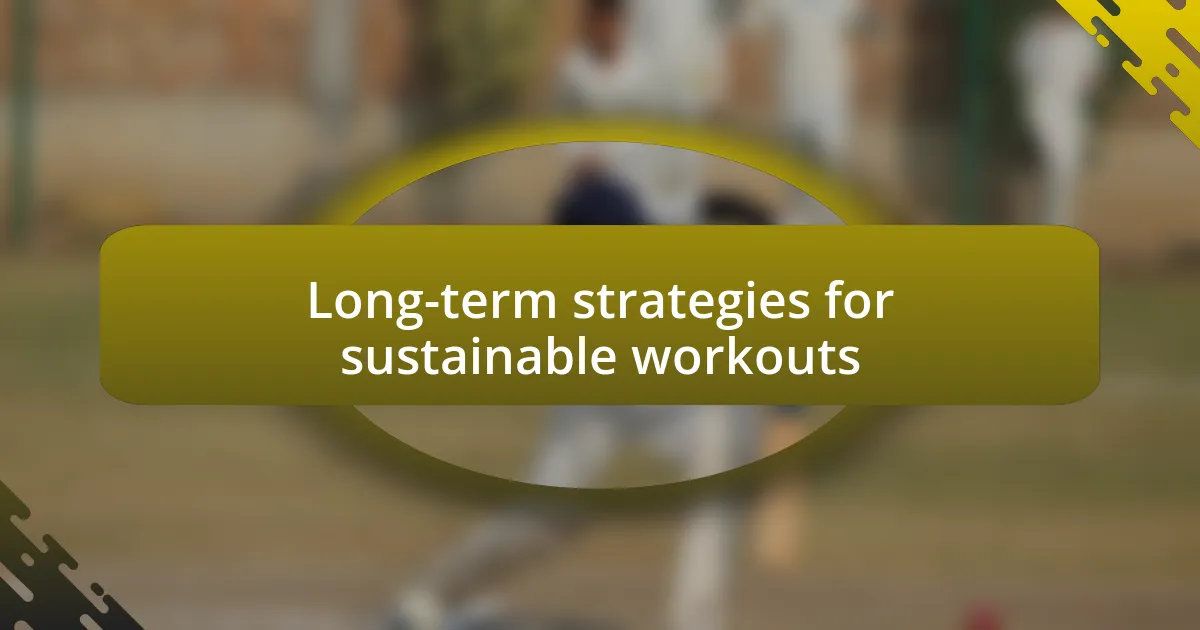Key takeaways:
- Workout fatigue results from intense physical demands, leading to muscle soreness, energy depletion, and mental exhaustion.
- Recognizing symptoms of fatigue, such as excessive soreness, lack of motivation, and cognitive fatigue, is crucial for proper recovery and avoiding injury.
- Rest and recovery are essential for muscle repair, mental clarity, and injury prevention, enhancing overall fitness performance.
- Proper nutrition and hydration significantly affect energy levels during workouts, with complex carbohydrates and protein being key components.

Understanding workout fatigue
Workout fatigue is something many of us encounter, often feeling like a heavy cloud that settles in after a challenging session. I remember when I first experienced it; I finished a grueling workout and couldn’t figure out why my body felt so drained. It made me wonder, why does fatigue hit us so hard after pushing our limits?
Scientifically, workout fatigue is a natural response to the intense physical demands we place on our bodies. It involves muscle soreness, energy depletion, and even mental exhaustion, reminding us of our body’s need for recovery. I can’t count the times I’ve found myself lying on the floor, contemplating what caused that exhaustion – was it my diet, sleep, or just my refusal to listen to my body?
It’s essential to recognize that fatigue can also be emotional, stemming from our mental state during workouts. While I push myself physically, I’ve noticed that if I’m stressed or distracted, my workouts feel much more draining. Have you ever felt that disconnect? It’s fascinating how our mental and emotional well-being can shape our physical performance, and understanding this connection has profoundly changed how I approach my fitness journey.

Recognizing symptoms of fatigue
Recognizing fatigue symptoms is crucial for maintaining a successful workout routine. One of the first signs I often notice is excessive soreness, particularly in muscles that typically feel good after exercise. There have been days when I hardly manage to lift my arms after a strength session; that’s when I know my body is signaling for a break. It’s a reminder to listen closely.
Another telling symptom is a decrease in motivation or enthusiasm to exercise. I remember occasions when I’d drag myself to the gym, feeling completely uninspired and mentally checked out. On those days, I’ve learned that pushing through can sometimes lead to longer recovery times or even injury. It’s essential to honor what my body is saying and give it the rest it truly needs.
Cognitive fatigue is also something I’ve come to recognize over time. If I find my focus wane during workouts, or my reaction times slow down, it’s a clear indication that my body needs recovery. I recall a session when I miscounted reps completely, which was a wake-up call. Understanding these symptoms helps me tailor my fitness regimen better, ensuring I respect my limits.
| Symptom | Description |
|---|---|
| Muscle Soreness | Excessive soreness that makes usual movements difficult |
| Lack of Motivation | Decreased desire or enthusiasm to engage in workouts |
| Cognitive Fatigue | Impaired focus and reaction time during activities |

Importance of rest and recovery
Rest and recovery are the unsung heroes of any workout routine. I’ve learned this the hard way, pushing myself to the limit only to end up more fatigued than motivated. Taking time off allows my muscles to rebuild stronger and my mind to refresh; it helps to avoid burnout, which is something I once experienced during a particularly intense training phase. I remember feeling resentful towards my workouts, which is when I realized that my body was desperately calling for a reset.
Here are a few critical points about why rest and recovery matter:
- Muscle Repair: After intense workouts, my muscles need time to heal. Rest allows microtears in muscles to recover, ultimately leading to gains.
- Mental Clarity: I’ve noticed that taking a rest day helps invigorate my mind, reigniting my motivation to work out. It’s essential for keeping my spirits high.
- Injury Prevention: Being overworked can lead to injuries, something I experienced when I ignored the signs. Recovery time helps to prevent those painful setbacks.

Nutrition tips to combat fatigue
Nutrition plays a pivotal role in ensuring I stay energized for my workouts. When I start feeling fatigued, I’ve found that incorporating complex carbohydrates, like sweet potatoes or brown rice, into my meals makes a significant difference. These foods provide slow-releasing energy, preventing that dreaded mid-workout slump that I’ve experienced more times than I care to admit.
I also pay close attention to my hydration, as it’s easy to overlook. I remember a tough training session where I barely took any sips of water. The fatigue hit me hard, leaving me sluggish and unfocused. Now, I always carry a water bottle and aim to drink before, during, and after my workouts. Staying well-hydrated not only helps fight fatigue but also improves my overall performance.
Lastly, I never underestimate the power of protein. After a workout, I make it a point to consume a protein-rich snack, like Greek yogurt or a protein shake. This not only aids in muscle recovery but also keeps my energy levels topped up, allowing me to feel more refreshed and ready for my next session. Isn’t it fascinating how what we eat can dramatically change our workout experiences?

Effective hydration strategies
Maintaining hydration is more than just sipping water—it’s about being strategic. During a recent workout, I made a conscious effort to include electrolyte drinks. I noticed a vast improvement in my stamina. I felt more alert and less drained compared to times when I relied solely on plain water. Have you ever tried adding a pinch of salt or a splash of lemon juice to your water? It can make a surprising difference.
I’ve learned to listen to my body regarding hydration cues. For instance, I often find that when I’m starting to feel fatigued, my lips dry out or I get a slight headache. These are signals that I need to refuel with fluids. It’s like my body’s way of saying, “Hey, you need more water!” Staying proactive by drinking when I’m not thirsty has become part of my routine, and it keeps that fatigue at bay during my training sessions.
Finally, I’ve discovered the value of timing my hydration. I usually drink a glass of water about 30 minutes before I start my workout. This preemptive strategy not only keeps me hydrated but also helps me avoid the discomfort of feeling bloated during exercise. It’s such a simple change, but it’s helped me feel lighter and more agile. What hydration strategies have you explored? Sometimes, fine-tuning your approach can yield impressive results.

Techniques for boosting energy
Finding ways to boost energy during workouts can make a significant difference in performance. One technique that I’ve personally found effective is incorporating quick bursts of movement, like jumping jacks or high knees, into my routine. Just a minute of these exercises helps kickstart my energy levels and gets the blood flowing, often reigniting my motivation when fatigue starts to creep in.
Another approach I’ve embraced is the power of music. Creating a playlist that energizes me has been a game-changer. I remember one session where I was feeling particularly sluggish, but once my favorite upbeat songs started playing, I felt an instant surge of motivation. It’s incredible how music can transform your mindset, isn’t it? I often wonder if the right track can sometimes outshine a cup of coffee.
Additionally, I’ve noticed that taking brief recovery breaks can really help. When I prioritize small pauses to stretch or breathe deeply, I often come back feeling refreshed. It’s almost like giving myself permission to recharge, which has helped me combat that overwhelming fatigue. Have you ever tried stepping back for a moment during intense exercise? Sometimes the simplest adjustments can lead to a more energized and enjoyable workout experience.

Long-term strategies for sustainable workouts
One effective long-term strategy I’ve embraced is establishing a consistent workout schedule. I find that having specific days and times set aside for exercise creates a routine, making it easier to commit. For instance, when I made Wednesday evenings my “workout night,” it became an integral part of my week, reducing the chances of skipping my sessions even when fatigue hits.
Additionally, I pay close attention to my nutrition, which directly impacts my energy levels. On days I prioritize whole foods and hydration, I feel noticeably more energized. It’s amazing how the right fuel can change your entire workout; I still remember a session where I opted for a nourishing smoothie before hitting the gym, and my performance skyrocketed. Have you ever noticed how your choice of pre-workout meals influences your energy?
Lastly, I find that setting realistic goals keeps my motivation high over the long haul. Instead of aiming for drastic changes, I focus on small, achievable milestones. This approach not only builds confidence but also helps me celebrate each win, no matter how minor. Each time I check off a goal, like increasing my reps or improving my time, it’s like giving myself a little high-five. How do you celebrate your own progress? Celebrating milestones reminds me that every step counts on this fitness journey.













